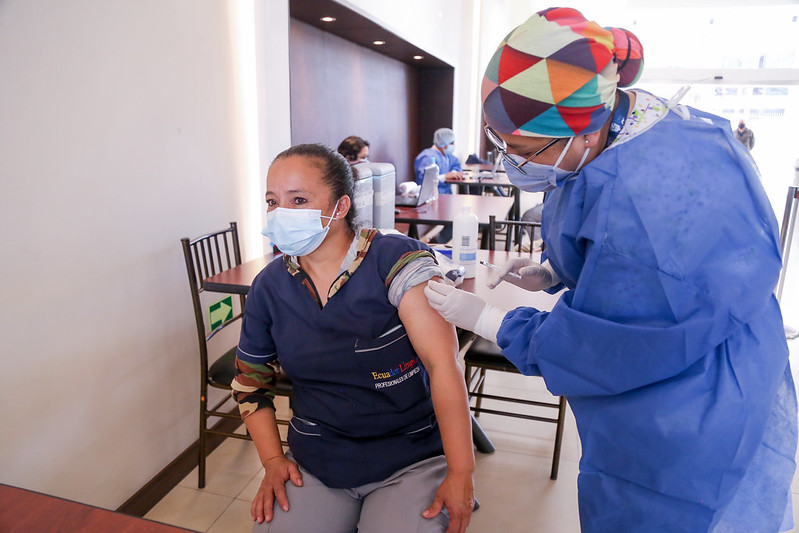Ecuador is in the middle of a storm that was raging in the region even before the beginning of the pandemic. But vaccination has become a wall for the government in that it has been limiting the demands of the different social sectors, who were showing little patience beforehand.
Almost two months after the inauguration of Guillermo Lasso, the main offer of his campaign – 9 million people inoculated in 100 days – is being fulfilled. Vaccine diplomacy has worked because the government has managed to get millions of doses of different brands into the country. Its alliance with private enterprise is proving effective in terms of logistics and support. In this way, the President has gained a bit of breathing room in the face of a scenario that is beginning to become heavy due to the complexity of the economic crisis.
In less than two months, Lasso has already faced the first attempt to paralyze the agricultural sector, specifically the rice growers, who have seen the price of a 100-pound quintal drop to less than USD 30 while rice smuggled in from Peru is sold at a better price in the market. The Secretary of Agriculture has offered to resolve the demands of this sector in 150 days.
Another front that the government cannot lose sight of if it thinks of medium- and long-term governability is the new leadership of the indigenous peoples and nationalities, which fell to the leadership of Leonidas Iza, who represents the most radical wing. The closest antecedent that measures the mobilization capacity of the indigenous movement is its protagonism during the social protest of October 2019. Lasso and Leonidas Iza are at opposite poles on issues of economy, state management, and environment.
Political management, foreign relations and pragmatism.
For a variety of reasons, it is not yet clear how the political team of the government will work. The main protagonist that served as Minister of Government, César Monge, was replaced by Alexandra Vela due to the fact that he is suffering from pancreatic cancer which has kept him away from the public sphere. This has created a wave of speculation. The ideological differences between the government and its allies -Pachakutik and Izquierda Democrática (The Democratic Left party)– to elect the authorities of the Assembly begin to show the lack of a programmatic agenda. Additionally, the government is trying to find an internal balance between the more neoliberal elements and a more moderate team with a social tinge.
Simultaneously, the government has strengthened its efforts to combat chronic child malnutrition, which has placed Ecuador in one of the worst positions in the region. The President’s slogan is a country free of malnutrition. Various business sectors, civil society organizations, international cooperation, and advisors on the subject have come together around this objective. However, for the moment there is no defined institutional architecture to carry it forward.
In light of the economic crisis and the events in neighboring Colombia, the government is being very cautious when it comes to making any decision. It has halted the government’s sending of a Tax Reform bill to the legislature, and no controversial, much less sensitive, measures have been announced. In this sense, although he is not yet facing a crisis and is rather trying to approach different sectors, he does not have the resources to satisfy all of the demands. Hence, Lasso may reach out to multilateral credit organizations to solve immediate needs.
In terms of foreign relations, the government has clearly defined its position. There has been a total distancing from Venezuela and Nicaragua. The government has opted to maintain a protocolary, but not close, relationship with the left-leaning governments in Bolivia and Argentina. The president has expressed concern about what is happening in Colombia and has not made any mention in his comments about the political situation in Peru. However, he plays multilateralism to get the vaccines, as he has stated that these have no ideology. Pragmatic steps, rather than ideological ones.
In the same sense, the President with the creation of the Undersecretary of Diversities (gender)has taken a singular step toward the further meshing of pragmatism and the identity of a statesman. He has said that he respects the criteria of the Constitutional Court regarding the decriminalization of abortion in cases of rape, despite his conservative beliefs and his affiliation to Opus Dei. Lasso has earned the respect for diversities, which have placed expectations on possible public policies that could favor them.
The government’s less than two months in power have passed in relative calm, especially considering that the country is suffering a severe economic crisis and went through a severe political crisis that began even before the pandemic. However, if the social sectors do not have effective answers to their demands, despite the fact that there are no resources at the moment, the country could witness a new social outbreak.
This article was translated from Spanish by Alek Langford
Photo of the National Assembly of Ecuador












